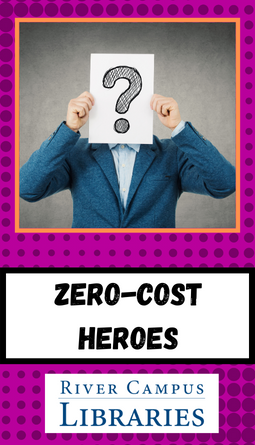
The Open Education Resources (OER) Working Group of the River Campus Libraries (RCL) is pleased to announce another round of Zero Cost Heroes (ZCH). This is our sixth round in four years and we are up to an official count of 41 and rising! Please see heroes of our first, second, third, fourth, and fifth rounds. We are especially proud to highlight the wide array of cost-saving heroes over the years who encompass faculty, instructors, researchers, staff, and students - both graduate and undergraduate.
For any number of reasons, all of our selected heroes have chosen to select, modify, or create course/educational materials that are free for students to use. Each day we'll highlight one hero, sharing their motivations for championing free educational materials and what their students have to say about zero-cost materials.
Spotlighting Zero-Cost Heroes is part of an ongoing RCL effort to ensure equity, access, and empowerment for all Rochester students. Other examples of this effort include the ACT commitment and much of what is found on the Open Education Services page, where you can view a number of presentations from our OER and Open Pedagogy workshop series.
Interested in exploring OER by discipline? Check out this new OER compilation.
Want to nominate someone as a Zero-Cost Hero? Submit here.
Monday’s Zero Cost Hero:
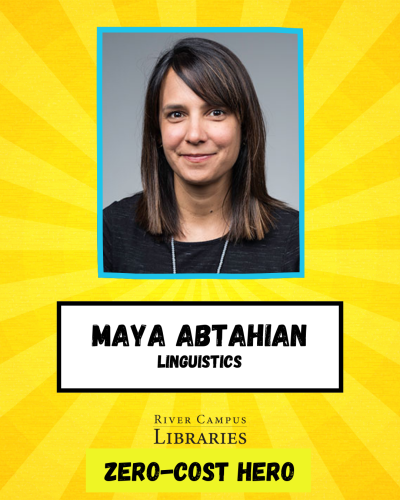
It has been about five years since Dr. Maya Abtahian has required any of her Linguistics students to purchase a textbook. Dr. Abtahian had already started to move away from traditional course materials when the COVID-19 pandemic caused many in academia to scramble to find online teaching resources. This sudden shift to an all-digital educational environment and then a move to hybrid instruction as the pandemic started to ease could have led Dr. Abtahian to rely on a major publisher’s pre-packaged courseware, but she chose to go a different route. Already a proponent of utilizing the River Campus Libraries’ course reserves program to offer her students an alternative to purchasing expensive course materials, Dr. Abtahian opted to forego traditional textbooks altogether and use online open educational resources (OER) instead.
In addition to lowering costs for her students, another benefit of using OER that Dr. Abtahian values is the fact that the students have immediate access to the required readings. She is able to dive right into the course content with her students on day one without having to worry about whether some of them will fall behind due to lack of access. “I no longer have to expect to wait for students to be able to do the readings because they haven't acquired the textbook yet,” Dr. Abtahian said. “From my perspective this is a huge benefit.” Sometimes her students even get a head start on the course readings before the semester begins.
Meanwhile, Dr. Abtahian has observed that the quality of available Linguistics OER has improved over time. For example, “I've been using Essentials of Linguistics for a few years,” she said. “This past fall was either the third or fourth time I've used it. We’re now on the 2nd edition of the textbook and I think it's very good. It has definitely improved in the 2nd edition over the 1st edition.”
Dr. Abtahian found the transition to OER to be relatively seamless. Hybrid classes had already caused her to incorporate other digital course materials, such as podcasts, into her teaching. For faculty considering a shift to OER, she notes that the changes can be made gradually, one piece of course content at time, if the wholesale move to OER seems like it might be too overwhelming or disruptive.
It’s likely Dr. Abtahian will be sticking with OER from now on. “I don't see doing this any differently in the future, unless some significant downside emerges, and it hasn't yet,” she noted.
Tuesday’s Zero Cost Hero:
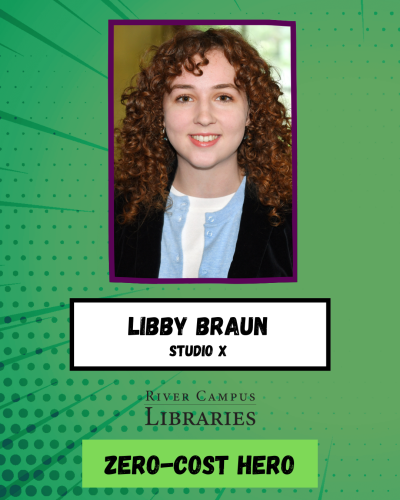
In summer 2024, Libby Braun ’25, Digital Media Studies major, participated in a summer internship with the River Campus Libraries within the Mary Ann Mavrinac Studio X. Libby’s internship project involved organizing and assessing Studio X’s Pre-College Program “Dreaming New Realities: Interactive Storytelling with Extended Reality (XR)”. The University of Rochester’s Pre-college Program is run through the Office of Admissions in which high school students come to UR to learn a skill. Studio X is one of the choices in courses offered within the Pre-College Program. In this program, high school students learn how to build a virtual reality (VR) experience from ideation and design thinking, 3D modeling and asset creation, and game development. Studio X received student feedback that the program was impactful but costly.
In response, Studio X decided to develop the instruction into an open educational resource (OER). Libby worked on this project in her internship over the summer and continued working on the materials through the Fall 2024 semester. It involved having consultations with the Open Publishing Librarian, the Data Curator Librarian, and the Scholarly Communication Strategist all within the River Campus Libraries. For other resources for this process, she referred to the libraries’ Open Scholarship topic guide.
When asked about adapting the actual materials for the program, Libby reviewed and revised all the slide decks, primarily to replace images with copyright friendly permissible images and then citing them. In making these materials OER, they are more accessible to the world without cost and for wider use. The individual workshops held over the course of the Pre-college Program were taught by other Studio X student employees which allowed them to practice teaching while honing their XR skills. The lesson slides were provided in addition to learning goals, objectives, and outcomes.
In the Studio X community within their Discord channel, a faculty member expressed gratitude for Libby making the OER and that access and equity are a huge deal. It takes time to polish the materials and making them ready for anyone to access and use. Libby states that “VR is an emerging technology, so accessibility and equity are crucial to allowing the technology to grow. Emerging technologies have barriers and if we can reduce those barriers as much as possible, we can advance the technology and bring it more into the mainstream.”
When asked if she would want to make an OER again she gave a hearty “yes.”
“It’s not as daunting as it seems and there is so much support in the libraries. Don’t be afraid to ask for help and get advice. I’d like to see more of Studio X’s programming be turned into OER to make the curriculum more accessible to all.”
This collection of StudioX Precollege Program OER is located within UR’s institutional repository, the University of Rochester Research Repository (URRR) and in StudioX’s projects page: Studio X Pre-College Program Open Education Resource | River Campus Libraries
Wednesday’s Zero Cost Hero:
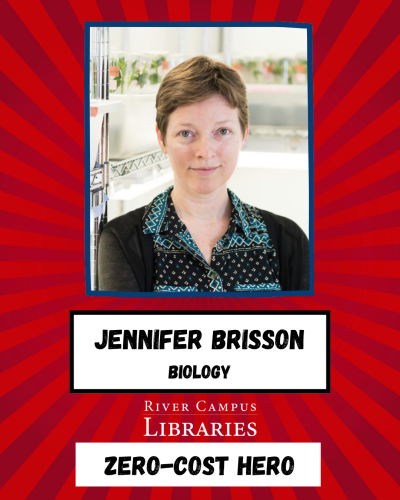
When Dr. Jennifer Brisson began teaching BIOL 190 at UR in 2015, she used a traditional genetics textbook that effectively explained complex concepts. She never received direct complaints about its cost, but an unexpected clue shifted her perspective. At the time, she used iClicker to assess student understanding, requiring an additional $15 app. She was surprised when students voiced frustration over this relatively small cost—prompting her to wonder: if $15 was a burden, how were they managing the much higher price of textbooks?
By 2020, Dr. Brisson was actively considering textbook costs and exploring alternatives. During a sabbatical that year, she transitioned her course to free, open educational resource (OER) textbooks. She adopted OpenStax Biology and OpenGenetics, supplementing them with assigned articles on emerging technologies like CRISPR. The reading requirements section of her syllabus now proudly states: “None to buy!”
Switching to OER texts wasn’t effortless. Her lecture slides were built around the traditional textbook, and restructuring course materials required significant time and effort. Since the OER texts followed a different topic sequence, she carefully curated readings from multiple sources to ensure a seamless learning experience. Despite the challenges, she found the transition worthwhile. Her advice to faculty considering OER? “It’s reasonably easy to implement if you’re given some time off from your course to do it.” The biggest challenge wasn’t finding quality resources—it was finding the time to adapt them.
Interestingly, Dr. Brisson hasn’t received much student feedback about the switch to OER. She wonders whether many students, regardless of whether they’re assigned a costly textbook or a free alternative, increasingly rely on online videos and digital resources instead. Still, she firmly believes that eliminating financial barriers is essential. “We’re ultimately here to help students get the best education they can. If they have economic obstacles and we can remove them, we should absolutely do it.”
Dr. Brisson’s commitment to openness extends beyond textbooks. In her research lab, transparency is a core value. “We should be more open about everything! Knowledge shouldn’t be behind paywalls.”
For faculty considering OER, she encourages them to explore the many high-quality resources available, especially for introductory courses. She also highlights the vital role librarians can play in the transition. “Knowing what was out there was super helpful,” she says, giving a special shout-out to Moriana Garcia, the former Biology liaison librarian, who provided examples of strong open resources. Dr. Brisson also secured a course improvement grant to hire a student who curated supplementary online videos, ensuring students had access to diverse learning materials.
With time and a willingness to rethink traditional course materials, Dr. Brisson successfully eliminated a major financial barrier—without compromising quality.
Thursday’s Zero Cost Hero:
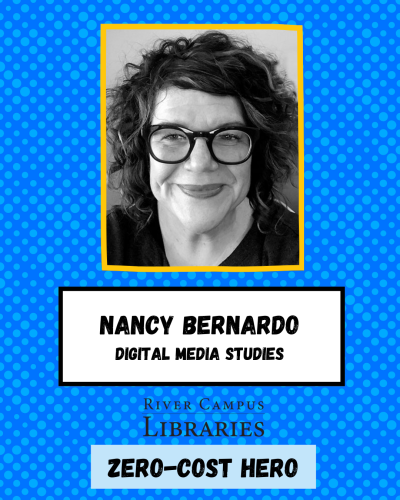
Professor of Digital Media Studies (DMST) Nancy A. Bernardo is committed to providing her students with free course materials in classes she teaches. Bernardo uses low-cost materials in her Graphic Design 1 & 2 classes, DMST Senior Capstone, and History of Graphic Design.
Bernardo was inspired to use zero-cost course materials when she saw that they improved accessibility and that they met students’ financial limitations. In graphic design, practitioners often have to buy their own fonts as well as the programs they use; but by designing her course to include low-cost materials, Bernardo helps students overcome that barrier to success. Bernardo also finds ways to incorporate UR Libraries’ e-books, creative commons materials, and resources from digital libraries (such as the Internet Archive) into her teaching, which she says provide material that is “just as important as a textbook.”
Bernardo also sees the real impact that zero-cost materials have on her students’ outcomes. When students are able to use open-source materials, what they’re able to produce turns out better. Providing access to low-cost course materials “lowers the cognitive load” for her students and gives them a jump start.
Bernardo very much plans to keep using zero-cost materials in her classroom and encourages other instructors to do the same. “Open education allows for open collaboration. It opens up opportunity for collaboration between people across communities to solve problems. … Be open to it. I’ve only scratched the surface.”
Friday’s Zero Cost Hero:
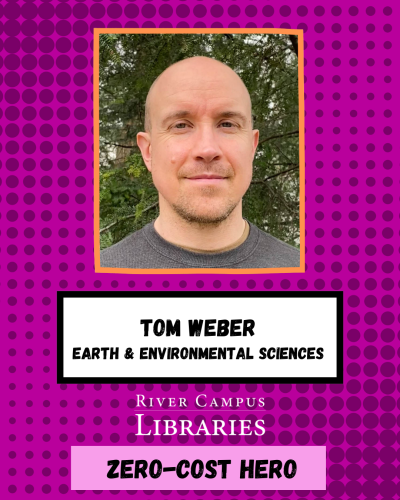
Growing up and studying in the U.K., Tom Weber never encountered the steep and ever-increasing costs of college textbooks that students in the U.S. face. When he was an undergraduate, books were reused year after year and easily accessible through the library. Later, his PhD advisor purchased his required books with grant funds. It wasn’t until Weber, now an Associate Professor of Earth & Environmental Sciences and a scholar in oceanographic sciences, began teaching in the U.S. that he realized what a financial burden his students carry. The cultural and financial differences between the two higher education systems had shielded him from considering the cumulative costs students pay for textbooks across all their courses.
Weber hadn’t set out to adopt an openly licensed textbook for his course, EESC 235/435: Physical Oceanography. Instead, he was looking to consolidate the two textbooks inherited from a previous instructor—both costly and physically cumbersome—into a single resource. One book focused on observational aspects of physical oceanography, while the other covered mathematical and theoretical concepts, together costing about $200. His goal was to find a single text that covered both areas.
His search led him to Introduction to Physical Oceanography by Robert Stewart. Weber selected this book based on recommendations from peers and the author’s strong scholarly reputation. The book met his needs academically—the content was exactly what he needed—and its status as an open educational resource (OER) was an unexpected bonus. Not only was it freely available, but also it solved a challenge presented by the original published structure of the book: its content was not in the order in which Weber would prefer to cover certain concepts. With this OER, Weber has the flexibility to modify and reorganize the content to better align with his teaching approach.
Beyond the textbook, Weber enhances student learning by integrating peer-reviewed articles from the library’s collection, ensuring students engage with both foundational knowledge and cutting-edge research. His strategy is straightforward: read the text, attend lectures, and then read more. This reinforcement before and after class strengthens comprehension. “Students are asking really good questions from the Stewart book, so it is clear they are reading the text,” he notes.
For faculty considering new textbooks, Weber emphasizes quality first: “Make sure to review the book closely and [determine] that it hits your criteria. I wouldn’t jump to an OER just because it’s free,” though he acknowledges that students certainly appreciate the cost savings.
Ultimately, Weber credits scholars like Robert Stewart as the true “zero-cost heroes”—experts who share their knowledge freely, expecting no royalties, so that future generations of students and educators can benefit.


